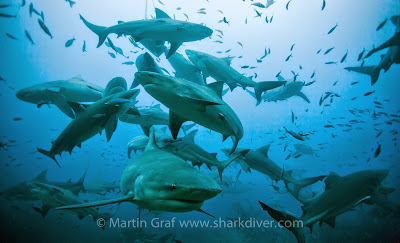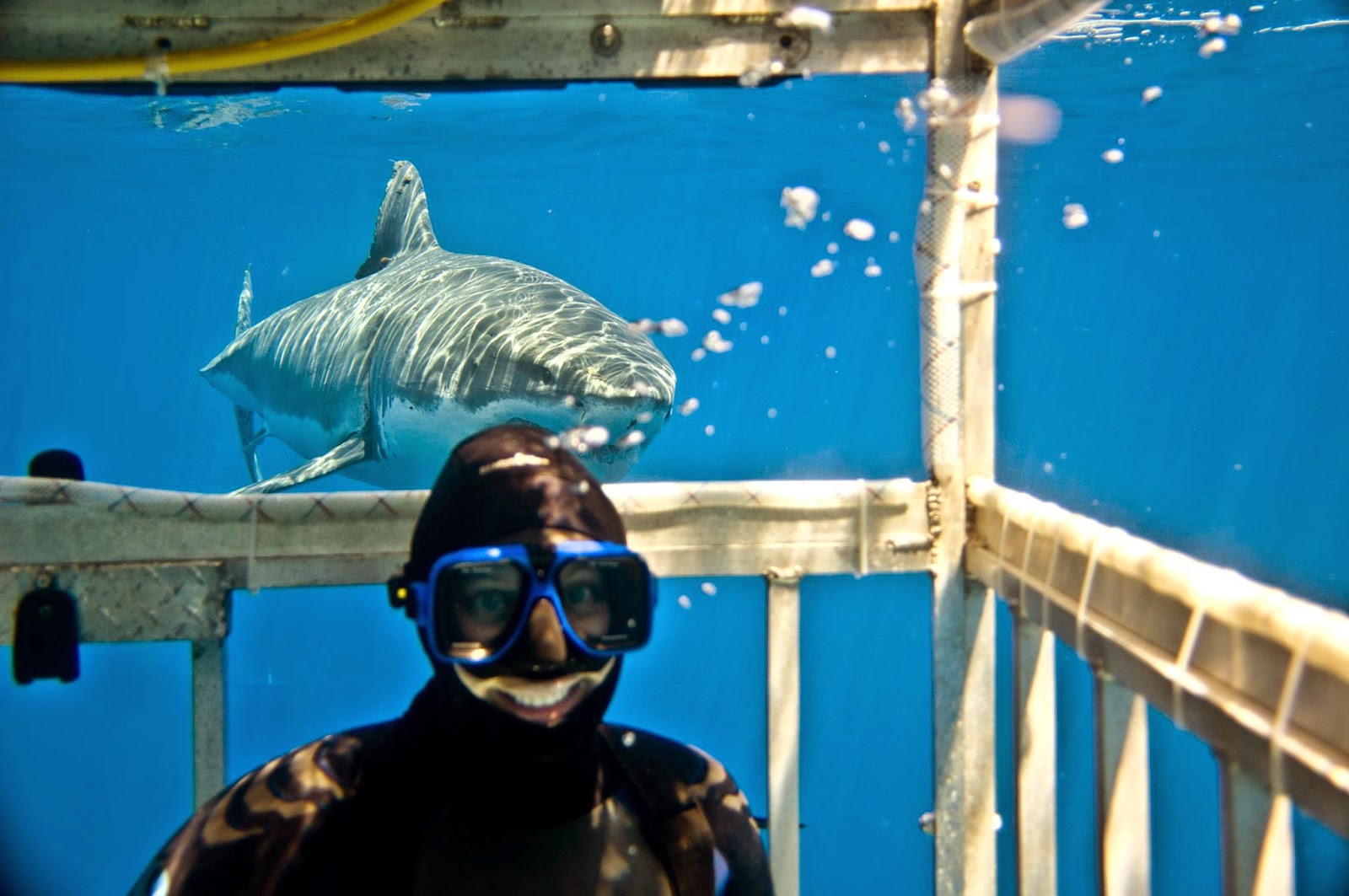I have to share DaSharks latest blog. It is actually a guest blog by Ian Campbell that talks about protecting sharks and how you can help.
Shark research, management & conservation intelligentsia meeting in Townsville, see below
Introduction by DaSharks:
Are you intrigued? 🙂
Here goes.
Ian Campbell is currently working for WWF’s Global Shark and Ray Initiative running the sustainable management component. He is also a Shark diver and a member of the SRMR management team.
From NGOs to the public and private sector, Ian has over 20 years’ experience in fisheries policy, ecology and fishery management working extensively within both the UK and internationally. Previous employment has included overseeing the reform of the EU’s Common Fisheries Policy for the Pew Charitable Trusts, fisheries observer on blue-fin tuna vessels, inshore fisheries management and as a commercial diver in the offshore sector.
Ian holds a Bachelor’s degree in Applied Marine Biology from Heriot-Watt University and a Master degree in Environmental Science from the University of Strathclyde.
This is an important initiative.
Having just returned from a meeting with major stakeholders, see at top, I’ve asked him whether he wouldn’t mind submitting a guest post presenting it to the wider public.
Here is Ian’s post.
Shark divers – An underused resource?
Fishing pressure, habitat loss, unsustainable consumption, or even fanciful claims of being “evolved for extinction” everywhere you look they are under the cosh. The pressure that sharks are under have probably best been summed up by the 2014 paper (and here – notice the part about research and data collection?) led by the IUCN Shark Specialist Group which concludes that almost a quarter of all sharks and rays (over 1,000 species assessed) are faced with the very real threat of extinction. Remember, this is not the claims of an environmental NGO, but an independent assessment of the current state of shark and ray populations by 128 experts from 35 different countries. Here’s a simple chart highlighting the different levels of threat.

As you can see, despite what you may hear from some campaigns, not all sharks are threatened, and some are in worse shape than others, but, for WWF, one of the biggest areas of concern is the shaded grey area on the left side of that chart. From all the 1,042 species assessed, 487 are “data deficient”.
Basically, virtually nothing is known about almost half of all sharks and rays.
Effective management and designing plans to reduce mortality is virtually impossible when faced with this lack of basic understanding. Imagine trying to balance your budget without knowing how much money you have in your account to start with, or the amount of interest you are receiving or paying out.
There are a number of conservation initiatives out there which lay claims to conserving sharks, from finning bans to fin trade bans (there’s a difference), from sanctuaries to species protections and from policies to plans. Some of these are more useful than others, but if any of them are to be truly effectual then one thing is key to them all: DATA!
Without a basic understanding of shark and ray populations both around the coast and in offshore waters, then making decisions for the long-term survival of these species is little more than a best guess. Yet there are a multitude of areas rich in information, but not necessarily being channeled in the right direction.
Divers, fishermen, market traders, even shark and ray researchers produce data every day, yet it is surprising how little of it actually makes its way to ministerial departments or independent bodies to assist with informed decisions for conservation. WWF are seeking to bridge this gap. We are developing a project in collaboration with some of the world’s leading shark researchers to create standard methodologies to maximize the benefits from untapped resources.
In 1999, the Food and Agriculture Organisation produced guidelines for countries to undertake a step-by-step process to developing long-term, sustainable shark management plans (known as National Plans of Action, NPOA).
This process seems relatively simple. Firstly, collect data on sharks and rays in the form of a Shark Assessment Report. Then use this data to develop your NPOA. While this does sound simple, and has been done in places like Australia, the EU and NZ (to varying degrees of vigour), the Pacific Islands have had to get by using the limited resources at their disposal. There are some NPOAs currently in existence in the region, such as the Cook Islands and Samoa. Other countries have draft versions waiting government endorsement, such Fiji and Tonga, while some countries such as Palau want to declare shark sanctuaries. These efforts for conservation & long-term planning are great, although all of these measures have one oversight in common. They are built on a lack of data. None of the countries have produced Shark Assessment Reports, so cannot fully know the issues within their territorial waters. This is not the fault of the Pacific Islands, gathering data can be time consuming for departments with limited resources, and the analysis requires specific technical expertise. Organizations such as the FFA and SPC are providing a great service, although their remit extends way beyond just looking at sharks.
So here is where WWF are stepping in.
As mentioned, we are collaborating with shark expertise far and wide to develop our shark ‘Rapid Assessment Tool-kit’ (or shark RAT). The main function of this is to design ways to collect and analyze data on coastal and pelagic sharks that can then be used to produce a Shark Assessment Report. The very basic baseline data in this report can in turn used by governments to develop conservation strategies that are then based on some sort of understanding.
Where is this data going to come from?
Well, there are a lot of sources we will be exploring from genetic and socioeconomic surveys at landing sites to extensive underwater video surveys, but one untapped goldmine is the information collected by divers. In Fiji, there is the Great Fiji Shark Count which is starting to produce comparable info. At present, this isn’t incorporated into management plans, so it’s high time it is.
There are also other things dedicated shark divers can be doing.
Ever been on a surface interval that seems to go on for ages? Sat at the bar for the post-dive drinks to talk about what you saw? How about these hours are spent helping screen underwater video footage that shows what happens at your dive site when no-one is in the water? Pretty much every diver would be able to recognise whether a shark or ray was in shot, and a huge number would even be able to say what species it was. Collecting and screening this type of data would take a massive burden off an already overstretched ministry or fisheries/shark specialist.
Obviously, we are well aware of the multitude of challenges that lay ahead for the project to be fully successful, and some methodologies that may look good on the page may fail spectacularly when introduced to the real world. But we have to try. Improved management for sharks and rays is the only thing that is going to directly reduce mortality. Not shark fin soup campaigns, or putting all your eggs into “ending finning” and certainly not cavorting in swimwear near sharks.
Last week WWF held a 3 day workshop where 12 of the best minds in their respective fields (I’m not including myself, I just took notes and provided the tea and coffee) provided input and direction.
As well as academic researchers from the fields of genetics, citizen science and eco-tourism, we had input from FFA, SPC and SPREP. Everyone we have spoken to has been enthusiastic and willing to support us. The people in attendance will now provide advice and recommendations to the project. Professor Colin Simpfendorfer, the co-chair of the IUCN Shark Specialist Group also gave us a name, although how serious he was is up for debate. WWF now convenes the Pacific Rapid Assessment Tool-kit Scientific Advisory Committee, or PRAT-SAC. Maybe the first thing we need to work on is the name?
The project is embryonic and there is a lot of hard work ahead, but with a little direction, continued enthusiasm and, more importantly, collaboration, then slowly we’ll restore the balance for sharks and rays
DaShark: Here’s to that – thanks buddy, appreciate!
Thanks indeed! I hope all of you will join in this effort to conserve our shark populations. And here you were, thinking you’re just having fun, when you’re diving with sharks.
Let’s go shark diving!
Martin Graf
CEO Shark Diver
About Shark Diver. As a global leader in commercial shark diving and conservation initiatives Shark Diver has spent the past decade engaged for sharks around the world. Our blog highlights all aspects of both of these dynamic and shifting worlds. You can reach us directly at staff@sharkdiver.com.







